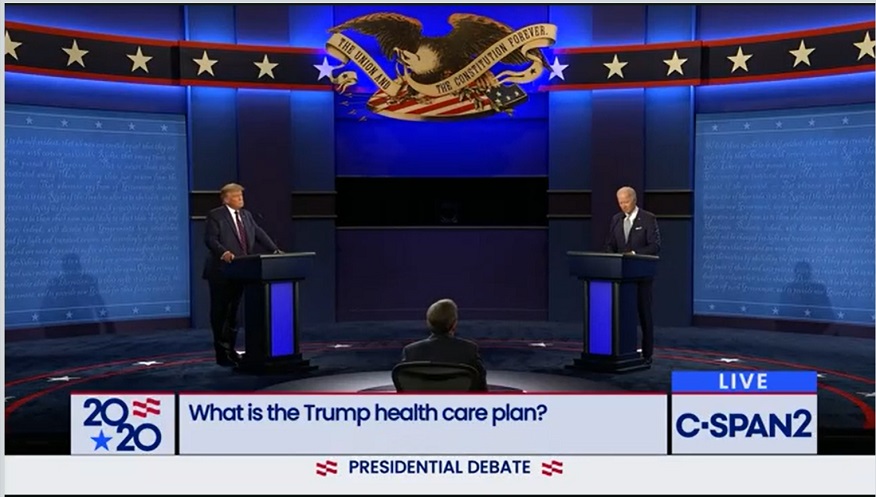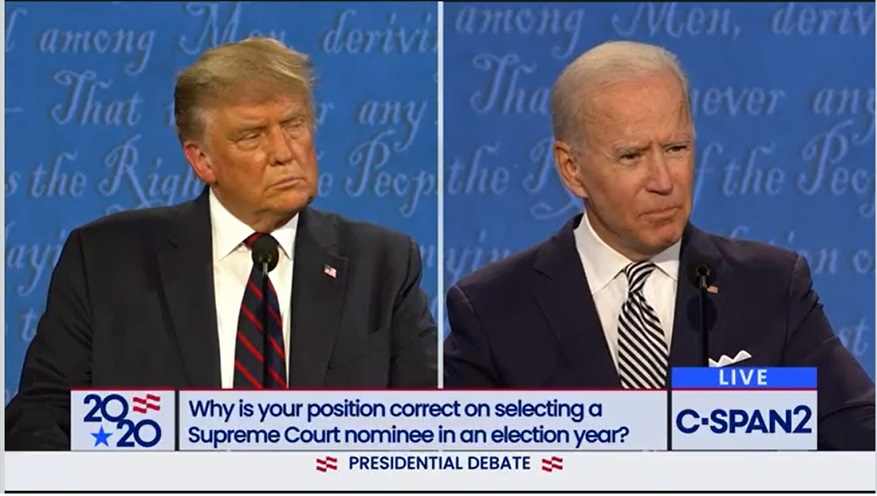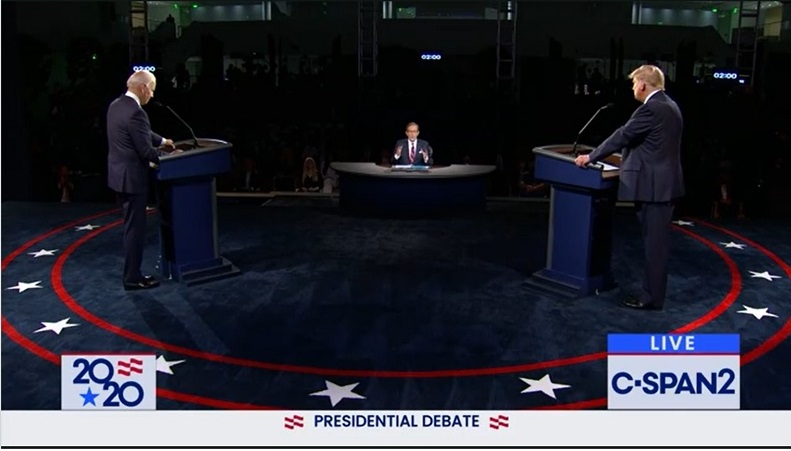
President Donald Trump, former Vice President Joe Biden and moderator Chris Wallace of Fox News are depicted during the Sept. 29 presidential debate. (NCR screenshot/C-SPAN)
President Donald Trump had a clear objective going into last night's debate: He needed to define Joe Biden as an unacceptable choice for the voters. His convention tried to do that, and failed. His barrage of tweets has tried to do that, and failed. He needed to make sure that at the end of the 90-minute debate, people saw Biden as a broken man incapable of leading the country.
Biden, like all challengers, needed to keep the focus on the incumbent, not least because of the dire straits in which the country finds itself. He needed to strike a most difficult balance between appealing to his base and appearing like a man who can unite a country divided and exhausted by Trump's antics.
Instead of a debate, the country witnessed the first ever debate that was not a debate at all, but a professional wrestling match in which the combatants happened to be wearing suits and ties. From the very beginning, the president kept interrupting Biden and within 20 minutes, the moderator, Fox News' Chris Wallace, was visibly and self-admittedly exasperated by the president's continued interruptions.
Halfway through the debacle, however, one sentence broke through the disjointed exchanges and countless interruptions. The president was asked about The New York Times' reporting on his federal income taxes. He denied the central claim of the Times' story and pivoted to allegations about Biden's son Hunter making millions of dollars from foreign corporations. Several minutes of mud wrestling ensued, but then Biden said something which may have won him the election. Looking into the camera, he said, "This is not about my family or his family. It is about your family."
Advertisement
If there were any undecided voters watching, they did not hear very much about the issues that would help them clarify their choice. Every discussion collapsed into mud wrestling but, as Wallace stated several times, it was the president who was the principal culprit in the undermining of the event itself with his petulant interruptions.
Wallace did not fact check the president in real time. Partisans for the president have learned to swallow his many lies, and they received a big helping tonight from his opening bizarre claim that he has a health care plan to replace Obamacare to his closing, equally bizarre inability to discuss climate change in an intelligent manner. Forest management? Clean air and water? No one is opposed to that, but they are a separate issue from climate change. Along the way he failed to denounce white supremacy when invited to do so repeatedly and, during a discussion of COVID-19, Trump pivoted to a puerile attack on Biden for not being smart and about what college the former vice president attended.
If we have learned anything about Trump in his past five years as a candidate and then as president, it is that statements that would sink a typical politician do not sink him. But it never happens, in part because the media is so tied to its Twitter feed that it fails to focus on what concerns voters. Best example from last night? Trump’s failure to denounce white supremacists outraged many of the media, but the no one in the CNN focus group of undecided Ohio voters brought it up. Their concerns were mostly stylistic with one exception: COVID-19 matters, and health care in part because of COVID-19.

President Donald Trump and former Vice President Joe Biden are depicted during the Sept. 29 presidential debate. (NCR screenshot/C-SPAN)
Partisans for Biden had to be worried that their candidate would have a moment when he lost his train of thought. Trump has been questioning Biden's mental acuity for weeks and the former vice president has aged markedly. I admit I was afraid a sustained "senior moment" might cause people to doubt Biden's fitness for office, and he was not exactly sharp in the first half of the debate. Oddly, Trump's repeated interruptions prevented that kind of moment from happening. More importantly, as the night went on, Biden not only did not collapse, he grew in stature. He needed to give as good as he got: Had he declined to interrupt the president in turn he would have looked like a patsy.
But in the last half of the debate, Biden managed to direct the conversation back to the voters, repeatedly looking into the camera and addressing the American people, expressing empathy for the challenges they face and sounding like someone who is sane, thoughtful and experienced. That was not enough to win in 2016, but in the midst of the ongoing COVID-19 crisis, and with the economic rebound shaky at best, it might be what the American people want now. Indeed, the sheer chaos of last night's debate was a stark reminder of how far our country has strayed from the idea that self-government is a good idea.
Biden's weakest moments came when Trump said Biden was a mere puppet, and that radical socialists would be pulling his strings. Biden distanced himself from Sen. Bernie Sanders a little too brutally and his effort to distinguish his climate change policy from the Green New Deal was artless. If I were involved in Biden's debate prep, I would focus on that before the next two sessions. Like the conventions, these debates are more get-out-the-vote events than exercises in persuasion.
Incumbent presidents often have a weak first debate performance. In 1984, President Ronald Reagan appeared confused during his first debate with Walter Mondale, but recovered in the second debate. Similarly, in 2012, commentators thought Mitt Romney "trounced" President Barack Obama in their first debate. Historical analogies, however, seem so completely irrelevant when analyzing Trump and his political trajectories.

President Donald Trump and former Vice President Joe Biden are depicted during the Sept. 29 presidential debate. (NCR screenshot/C-SPAN)
That said, only one candidate entered last night’s debate ahead in the polls and it was not the president. Trump needed to change the dynamic of the race. When even former Pennsylvania Sen. Rick Santorum, a Republican, admitted on CNN that "Trump hurt himself" on the debate stage, you know that the president's campaign did not get the shot in the arm he needed.
In trying to determine if last night's debate moved the needle, keep an eye on Fivethirtyeight.com. The national polls had barely moved in recent weeks but I keep my eye on the president's approval rating. That number has moved up a full point since Sept. 9, from 42.6% to last night's 43.7%, which, I suspect, represents Republicans coming home due to the court vacancy and the nomination of a conservative. Conversely, his disapproval dropped from 54.7% on Aug. 24, to 52.5% going into last night’s debate.
As I wrote last week after the death of Justice Ruth Bader Ginsburg:
The real area where Trump might get a boost is among the 3% to 4% of voters who do not approve of him but still prefer him to Biden, a group … critical to the president's reelection hopes. The president's campaign needs to make sure they do not stay home, and while they may not be motivated by the court as an issue, their distaste for Trump may soften as the process unfolds.
What I will be looking at in the days ahead is whether that percentage of people who disapprove of Trump but prefer him to Biden grows or not. If all 3% to 4% of them turn out and vote for Trump, he will win. If none of them turn out, and Trump only has 43.7% on Election Day, Biden will win in a landslide.
Watching the debate, people who like Trump found plenty to like, and people who like Biden could feel confirmed in their choice. The sliver of undecided voters probably is not looking at a decision between Biden or Trump but between Trump and staying home.
Biden is the candidate polling north of 50%, so it is Trump who needs to not only motivate his base but to convince the wafflers. Nothing the president did last night, rhetorically or stylistically, would cause a waffler to flock to Trump's support. More importantly, nothing Biden did might scare the wafflers into voting for Trump.
Debate No. 1 goes to Biden.
[Michael Sean Winters covers the nexus of religion and politics for NCR.]
Editor's note: Don't miss out on Michael Sean Winters' latest. Sign up and we'll let you know when he publishes new Distinctly Catholic columns.




